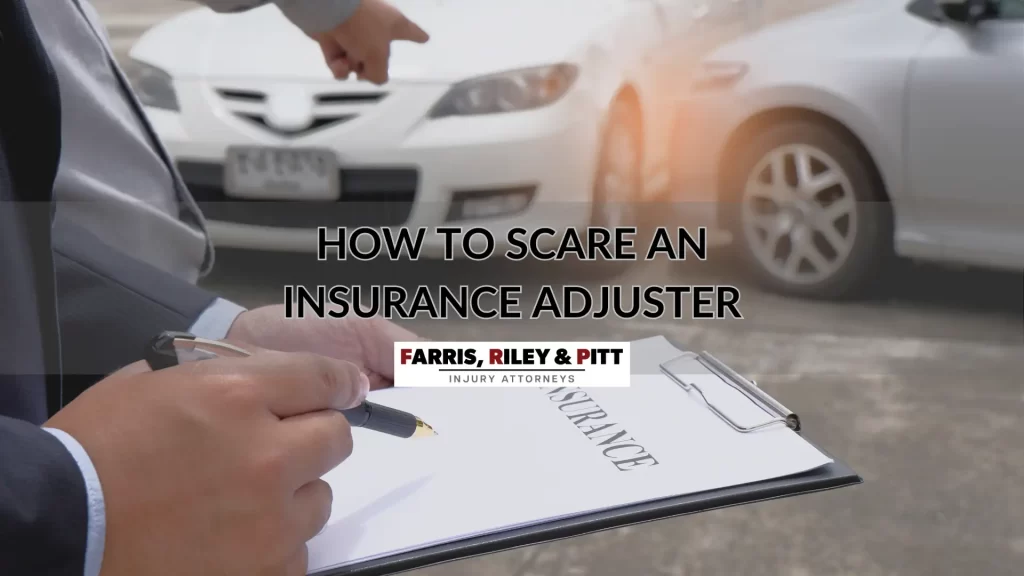Posted on Wednesday, February 8th, 2023 at 10:55 am

Insurance companies are large, intimidating businesses. Adjusters are the ones handling the injury claims, and it’s their job to try to avoid paying. They want to reduce the value as much as possible or find a sufficient reason to deny the claim.
Dealing with the insurance adjuster might seem scary and overwhelming. However, you can turn the tables and gain the upper hand by understanding their tricks and how to handle them.
Here we explain the scare tactics often used by insurance adjusters, what to do if one calls you, and actions to avoid after an accident.
Scare Tactics Used by Insurance Adjusters After Accidents
An insurance adjuster gets assigned to your claim after you file it. They will review the information to determine if their policyholder is at fault and should be liable for your injuries. Despite how they treat you, remembering they are not on your side is critical. They might act like they want to help you, but their priority is to avoid a significant payout.
They might search for evidence to show you are partially responsible for the incident or prove your injury isn’t as severe as you claim. If they can get away with denying the claim or settling for much less than you deserve, they will.
The most common tactics insurance adjusters use include:
- Delay the process – You might hope to resolve your claim quickly to recover the money you need to pay your medical bills and other expenses. Waiting for the insurance adjuster to respond to your calls and emails can be frustrating. Your adjuster might not answer you right away. You could wait days or weeks for a response. The tactic is to get you to give up or accept any lowball offer they provide.
- Ask specific questions – Insurance adjusters want to know how the accident happened, what injuries the victim sustained, and other relevant details to determine liability. They might ask pointed questions requiring a yes or no answer. When you can’t elaborate, it traps you into saying something potentially damaging to your claim.
- Require an independent medical exam – An independent medical examination (IME) is an appointment with a doctor chosen by the insurance carrier. The adjuster can review separate medical evidence to determine if your initial diagnosis aligns with the other doctor’s diagnosis. Uncovering discrepancies can negatively affect your claim.
How to Handle Conversations with the Insurance Adjuster
The insurance adjuster will likely call you soon after you file your claim to discuss the accident. You should not speak to them. If they ask questions or imply that you might be at fault, politely inform them that you hired a lawyer and that the adjuster should talk to them. Feeling the need to defend yourself or explain the situation can only hurt your case.
There is no law requiring you to provide a recorded statement. The adjuster might scare you into believing it’s a requirement. However, you can decline. The problem with a recorded statement is that it becomes evidence they might use against you if you say something that could harm your claim.
Things You Should Never Do After an Accident
 You must avoid apologizing or admitting you might be at fault for the accident. The insurance adjuster looks at an apology as an admission of guilt. Although you feel bad about what happened, especially if someone gets hurt, saying as little as possible to the other parties involved, any investigating officer, and witnesses is the best strategy.
You must avoid apologizing or admitting you might be at fault for the accident. The insurance adjuster looks at an apology as an admission of guilt. Although you feel bad about what happened, especially if someone gets hurt, saying as little as possible to the other parties involved, any investigating officer, and witnesses is the best strategy.
If the adjuster sends you a HIPAA form requesting your signature, advise them that you will submit your accident-related medical records once your treatment ends or tell them to call your lawyer. You don’t have to give the insurance company written authorization to request copies of your records. That authorization opens the door to your entire medical history. They might find evidence they can use to deny your claim by arguing your injury is due to a pre-existing condition.
Social media can also be problematic during an insurance claim. Most people don’t realize insurance companies can review public social media accounts for incriminating evidence. You should avoid posting pictures, commenting on others’ pages, and sharing information about your claim.
How You Can Scare Your Insurance Adjuster
You don’t have to pursue your claim alone. The best way to scare an insurance adjuster is to hire a seasoned attorney who knows how to handle your type of case. Farris, Riley & Pitt, LLP can step in and help. With over 25 years of experience, our legal team can provide efficient and dependable representation. We will handle every aspect of your claim to try to reach a favorable result.
If someone’s negligence caused your injuries in an accident, call us at (205) 324-1212 for a free consultation with a dedicated Birmingham personal injury lawyer. Let our team of attorneys fight for you.















